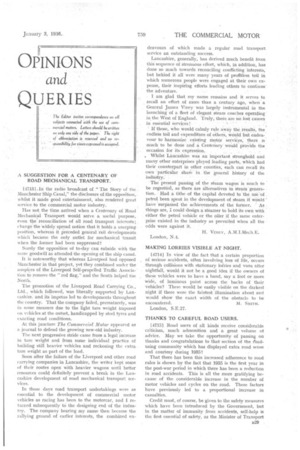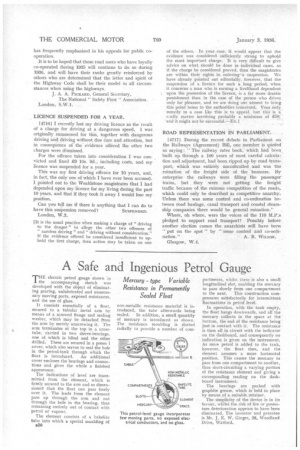OPINIONS
Page 39

Page 40

If you've noticed an error in this article please click here to report it so we can fix it.
and
QUERIES
A SUGGESTION FOR A CENTENARY OF ROAD 'MECHANICAL TRANSPORT.
t4713l In the radio broadcast of " The Story of the Manchester Ship Canal," the disclosure of the opposition,. whilst it made good entertainment, also rendered great service.to the commercial motor industry.
Has not, the time arrived when a Centenary of Road Mechanical Transport would serve a useful purpose, even the' reconciliation of all road transport interests; , change the Widely spread notion that it holds a usurping. position, whereas it preceded general 'rail developments which 'became the only outlet for mechanical transit when the former had been suppressed?.
Surely the opposition' of to-day can subside with the same goodwill as attended the opening of the ship canal.
It is noteworthy that whereas Liverpool had opposed Manchester in that project, yet they combined under the auspices of the Liverpool Self-propelled Traffic Associa-' lion to remove.the "red flag," and the South helped, the North.
The promotion of the .Liverpool Road Carrying Co., Ltd., which. followed, Was liberally supported by Lancashire, and its impetus led to developments throughout the country. That the company failed, prematurely, was in some measure due to the light tare weight imposed on vehicles at the outset, handicapped by steel tyres and exacting road conditions.
At this juncture The Commercial Motor appeared as a journal to defend the growing new-old industry.
The next progressive stride came from a legal increase in tare weight and from some individual practice of building still heavier vehicles and reckoning the extra . tare weight as part of the load.
Soon after the failure of the Liverpool and other road carrying companies in Lancashire, the writer kept some of their routes open with heavier wagons until better resources could definitely prevent a break in the Lancashire development of road mechanical transport services.
In those days road transport undertakings were as essential to the development of commercial motor vehicles as racing has been to the motorcar, and I returned subsequently td the designing end of the industry. The company bearing my name then became the rallying ground of earlier interests, the combined en
deavours of which made a regular road transport service an outstanding success.
Lancashire, generally, has derived much benefit from this sequence of strenuous effort, which, in addition, has done so much towards reconciling conflicting interests, but behind it all were many years of profitless toil in which numerous people were engaged at their own expense, their inspiring efforts leading others to continue the adventure.
I. am glad that my .name remains and it serves to recall an effort of more than a century ago, when a General James Viney was largely instrumental in the launching of a fleet of elegant steam coaches operating in the West of England. Truly, there are no lost causes in essential 'services' If those, who would calmly rule away the results, the endless toil and expenditure of others, would but endea-. your to harmonize existing motor services, there is much to be done and a Centenary would provide the
occasion for its expression. . .
. Whilst Lancashire was an important stronghold and many other enterprises played leading parts, which had their counterpart in other counties, each can recall its own 'particular share in the keneral history of the industry.'
The present passing of the steam wagon is much to be regretted, as there are alternatives in Ste* "genera.tion. Had a tithe of the 'capital devoted to the use of petrol been spent in the development of steam if would have surpassed the achievements of the former. As things are, I could design a steamer to hold its own with either the petrol vehicle or the oiler if the same enterprise existed in the industry as prevailed when all the odds were against it.
H. VINEY, A.M.I.Mech.E. London, N.4.
MAKING LORRIES VISIBLE AT NIGHT.
L4714] In view of the fact that a certain proportion of serious accidents, often involving loss of life, occurs through collisions with stationary loiries and vans after nightfall, Would it not be a good idea if the owners of these vehicles were to have a band, Say a foot or more wide, of luminous paint across the backs of their vehicles? These would be easily visible on the darkest night if there were the faintest illumination about and would show the exact width of the obstacle to be
encountered. M. SMITH. London, S.E.27.
THANKS TO CAREFUL ROAD USERS.
[4715] Road users of all kinds receive considerable criticism, much admonition and a great volume of advice. May we take the opportunity of passing on thanks and congratulations to that section of the fadusing community which has displayed extra road sense
and courtesy during 1935? • That there has been this increased adherence to road rules is shown by the fact that 1935 is the first year in the post-war period in which there has been a reduction in road accidents. This is all the more gratifying because of the considerable increase in the number of motor vehicles and cycles on the road. These factors have previously led to a proportional increase in casualties.
Credit must, of course, be given to the safety measures which have been introduced by the Government, but in the matter of immunity from accidents, self-help is the first essential of safety, as the Minister of Transport
has frequently emphasized in his appeals for public cooperation.
It is to be hoped that those road users who have loyally co-operated during 1935 will continue to do so during 1936, and will have their ranks greatly reinforced by others who are determined that the letter and spirit of the Highway Code shall be their model in all circumstances when using the highways.
J. A. A. PICKARD, General Secretary, . The National" Safety First " Association.• London, S.W.1.
LICENCE SUSPENDED FOR A YEAR.
[47161 I recently lost my driving licence as the result of a charge for driving at a dangerous speed. I was originally summoned for this, together with dangerous driving and driving without due dare and attention, but in consequence of the evidence offered the other two charges were dismissed.
For the offence taken into consideration I was convicted and fined £9 10s. 9d., including costs, and my licence was suspended for a year.
This was my first driving offence for 10 years, and, in fact, the only one of which I have ever been accused. I pointed out to the Wealdstone magistrates that I had depended upon my licence for my living during the past 10 years, and that if they took it away I would lose my position.
Can you tell me if there is anything that I can do to
have this suspension removed? SUSPENDED. London, W.3.
[It is the usual practice when making a charge of "driving to the danger" to allege the other two offences of careless driving" and "driving without consideration." If the evidence offered be considered insufficient to uphold the first charge, then action may be taken on one of the others. In your case, it would appear that the evidence was considered sufficiently strong to uphold the most important charge. It is very difficult to give advice on what should be done in 'individual cases, as if the charge be considered proved, then the magistrates are within their rights in ordering'a suspension. We have already pointed out editorially, however, that the suspension of a licence for such a long period, when it concerns a man who is earning a livelihood dependent upon the possession of the licence, is a far more drastic punishment than in the case of the person who drives only for pleasure, and we are doing our utmost to bring this point home to the authorities concerned. Your onlY remedy in a case like this is to appeal, but this is a costly matter involving probably a minimum of £59, and it might not be successful.—En.]
ROAD REPRESENTATION IN PARLIAMENT.
[47171 During the recent debate in Parliament on the Railways (Agreement) Bill, one member is quoted as saying : "The railway rates book, which had been . built up through a 100 years of most careful calculation and adjustment, had been ripped up by road transport, which was entirely uncontrolled and was the ruination of the freight side of the business. By enterprise the railways were filling the passenger trains, but, they were not getting the freight traffic because of the ruinous competition of the roads, which could only be described as competitive anarchy. Unless there was some control and co-ordination between road haulage, canal transport and coastal steamship companies there would be general ruination."
Where, oh where, were the voices of the 110 M.P.s pledged to support road transport? Possibly before another election comes• the anarchists will have been " put on the spot" by "some control and co-ordi
nation." A. R. WILSON. Glasgow, W.4.




















































































